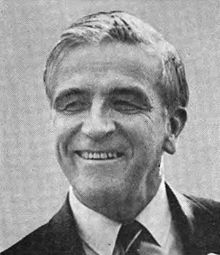John G. Dow
John G. Dow | |
|---|---|
 | |
| Member of the U.S. House of Representatives from New York's 27th district | |
| In office January 3, 1971 – January 3, 1973 | |
| Preceded by | Martin B. McKneally |
| Succeeded by | Howard W. Robison |
| In office January 3, 1965 – January 3, 1969 | |
| Preceded by | Katharine St. George |
| Succeeded by | Martin B. McKneally |
| Personal details | |
| Born | John Goodchild Dow May 6, 1905 New York City, U.S. |
| Died | March 11, 2003 (aged 97) Suffern, New York, U.S. |
| Political party | Democratic |
| Education | Harvard University Columbia University |
John Goodchild Dow (May 6, 1905 – March 11, 2003) was an American business executive, government administrator, and politician from New York. He was most notable for his three terms of service as a Democratic member of the United States House of Representatives from 1965 to 1969 and 1971 to 1973.
Early life
[edit]Dow was born in New York City, the son of Elizabeth (Goodchild) and architect, artist, and author Joy Wheeler Dow.[1] He was raised in New Jersey and Kennebunkport, Maine, and attended Brown University.[1] He later transferred to Harvard University, from which he graduated with a Bachelor of Arts degree in government in 1927.[1]
Dow was a business executive and consultant from 1929 to 1964, and specialized in strategic planning and systems analysis for large corporations.[1] He received a Master of Arts degree in political science from Columbia University in 1937.[1] From 1950 to 1964, Dow was the director of civil defense in Grand View, New York.[1] From 1964 to 1965, he was chairman of Grand View's zoning board of appeals.[1]
Active in politics as a Democrat, Dow ran unsuccessfully for the New York State Senate in 1954, the New York State Assembly in 1956, and Town Supervisor of Orangetown, New York, in 1963.
Congressman
[edit]Dow was elected to Congress in 1964, defeating 18-year incumbent Katharine St. George.[1] He was reelected in 1966, and served from January 3, 1965, to January 3, 1969, and was described as an early opponent of the Vietnam War.[1] He was a delegate to the 1968 Democratic National Convention. He unsuccessfully ran for re-election to the U.S. House in 1968, losing to Republican Martin B. McKneally.[1] From 1968 to 1970, Dow worked on the staff of the U.S. House. In 1970, he defeated McKneally and served in Congress a second time from January 3, 1971, until January 3, 1973.[1]
Later career
[edit]In 1972, Dow was redistricted into New York's 26th congressional district following publication of the 1970 United States Census; he lost his re-election bid to Republican Benjamin A. Gilman.[2] Dow was assistant director of New York State's comprehensive employment training act program from 1976 to 1982, and was the founder of Americans Against Nuclear War in 1980.[2] He unsuccessfully ran for Congress in 1974, 1982 and 1990.
Artist
[edit]Dow and his wife dealt in antiques, and were regular participants in antique shows throughout the northeast United States.[1] Dow was also a landscape painter, and his works were exhibited at the Edward Hopper House in Nyack, New York, and other galleries.[1]
Death
[edit]He died in Suffern, New York, on March 11, 2003.[1]
Legacy
[edit]The post office in Tappan, New York, was named the John G. Dow Post Office Building in 2003.
Family
[edit]In 1930, Dow married Harriet (maiden name Dow) of Maine (1906-2001).[1][3] Their children included Thomas, Timothy, Diantha, and Sophia.[1][3]
References
[edit]Sources
[edit]Newspapers
[edit]- "Obituary, John G. Dow". The Journal News. White Plains, NY. March 14, 2003.
- "Death Notice, John G. Dow". The Washington Post. Washington, DC. March 15, 2003.
Books
[edit]- Round, Harold F. (1968). The History & Genealogy of the Varrell-Verrill and Associated Families. Bryn Mawr, PA: H. F. Round.
External links
[edit]- United States Congress. "John G. Dow (id: D000462)". Biographical Directory of the United States Congress.


 French
French Deutsch
Deutsch